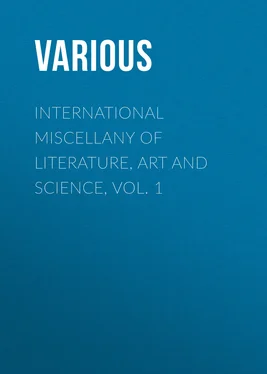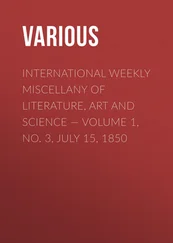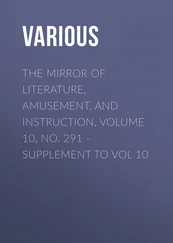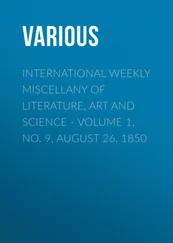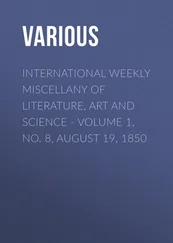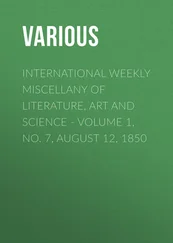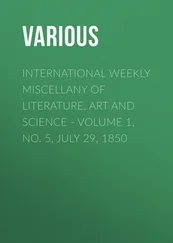Various - International Miscellany of Literature, Art and Science, Vol. 1
Здесь есть возможность читать онлайн «Various - International Miscellany of Literature, Art and Science, Vol. 1» — ознакомительный отрывок электронной книги совершенно бесплатно, а после прочтения отрывка купить полную версию. В некоторых случаях можно слушать аудио, скачать через торрент в формате fb2 и присутствует краткое содержание. Жанр: foreign_antique, periodic, foreign_edu, на английском языке. Описание произведения, (предисловие) а так же отзывы посетителей доступны на портале библиотеки ЛибКат.
- Название:International Miscellany of Literature, Art and Science, Vol. 1
- Автор:
- Жанр:
- Год:неизвестен
- ISBN:нет данных
- Рейтинг книги:3 / 5. Голосов: 1
-
Избранное:Добавить в избранное
- Отзывы:
-
Ваша оценка:
- 60
- 1
- 2
- 3
- 4
- 5
International Miscellany of Literature, Art and Science, Vol. 1: краткое содержание, описание и аннотация
Предлагаем к чтению аннотацию, описание, краткое содержание или предисловие (зависит от того, что написал сам автор книги «International Miscellany of Literature, Art and Science, Vol. 1»). Если вы не нашли необходимую информацию о книге — напишите в комментариях, мы постараемся отыскать её.
International Miscellany of Literature, Art and Science, Vol. 1 — читать онлайн ознакомительный отрывок
Ниже представлен текст книги, разбитый по страницам. Система сохранения места последней прочитанной страницы, позволяет с удобством читать онлайн бесплатно книгу «International Miscellany of Literature, Art and Science, Vol. 1», без необходимости каждый раз заново искать на чём Вы остановились. Поставьте закладку, и сможете в любой момент перейти на страницу, на которой закончили чтение.
Интервал:
Закладка:
Is it to myself, or to others, that the published pages of these Confidences can have done injury in the view of those who have read them? Is there a single man now living, is there a single memory of one of the dead, on whom these recollections have cast an odious or even unfavorable light, whether on his name, his family, his life, or his grave? Have they brought sadness to the soul of our mother in the heaven where she resides? Has the manly face of our father been lessened in the respect of his descendants? Has Graziella , that precocious and withered flower of my early manhood, received aught beyond a few tears of young girls shed on a tomb at Portici? Has Julia, the worship of my young enthusiasm, lost in the imagination of those who know the name, that purity which she has preserved in my heart? And my masters, those pious Jesuits, whose name I love not, but whose virtue I venerate; my friends, dearest and first harvested, Virieu Vignet, the Abbe Dumont, could they complain, returning here below, that I have disfigured their beautiful natures, discolored their noble images, or soiled one place in their lives? I appeal to all who have read. Would a single shade command me to efface a single line? Many of whom I have spoken are still living, or their sisters, or their sons, or their friends: have I humiliated them? They would have told me.
No! I have embalmed only pure recollections. My shroud was poor, but it was spotless. The modest name I have wrapped there for myself will neither be adorned nor dishonored by it. No tenderness will reproach me; no family will accuse me of profanation in naming it. A remembrance is an inviolable thing because it is voiceless, and must be approached with piety. I could never console myself if I had allowed to fall from this life into that other life, whence no one can answer, one word which could wound those absent immortals whom we call the dead. I desire that not a single word, thoughtfully uttered, should remain after me against one of the men who will one day be my survivors. Posterity is not the sewer of our passions—it is the urn of our memories, and should preserve nothing but perfumes.
These Confidences have then done injury or caused pain to no one, among the living or among the dead. I mistake, they have done injury to me, but to me alone. I have depicted myself such as I was: one of those natures, alas! so common among the children of women, wrought not of one clay only, not of that purified and exceptional substance which forms heroes, saints, and sages, but moulded of every earth which enters into the formation of the weak and passionate man; of lofty aspirations, and narrow wings; of great desires, and short hands to reach whither they are extended; sublime in ideal, vulgar in reality; with fire in the heart, illusion in the mind, and tears in the eyes; human statues, which attest by the diversity of the elements that compose them, the mysterious failings of our poor nature; in which, as in the metal of Corinth, we find after the fire the traces of all the melted metals which were mingled and confounded in it, a little gold and much lead. But, I repeat, whom have I injured but myself?
But they say, these unvailed exposures of sentiments and of life offend that virginal modesty of soul, of which outward modesty is but an imperfect emblem? You show ourself unvailed, and you do not blush! Who then are you?
Alas! I am what you see, a poor writer; a writer, that is to say, a thinker, in public. I am, less their genius and virtue, what were St. Augustine, Jean Jacques Rousseau, Chateaubriand, Montaigne, all those men Who have silently interrogated their souls and replied aloud, so that their dialogue with themselves might also be a useful conversation with the century in which they lived, or with the future. The human heart is an instrument which has neither the same number nor quality of chords in every bosom, and on which new notes may eternally be discovered and added to the infinite scale of sentiments and melodies in the universe. This is our part, poets and writers in spite of ourselves, rhapsodists of the endless poem that nature chants to men and God! Why accuse me, if you excuse yourselves? Are we not of the same family of the Homeridae , who from door to door recount histories, of which they are by turns the historians and the heroes? Is it, then, in the nature of thought to become a crime in becoming public? A thought, vulgar, critical, skeptical, dogmatic, may, according to you, be unvailed innocently: a sentiment, commonplace, cold, not intimate, awaking no palpitation within you, no response in others, may be revealed without violation of modesty; but a thought that is pious, ardent, lighted at the fire of the heart or of heaven, a sentiment burning, cast forth by an explosion of the volcano of the soul; a cry of the inmost nature, awaking by its accent of truth young and sympathetic voices in the present age or the future: and above all, a tear! a tear not painted like those which flow upon your shrouds of parade, a tear of water and salt, falling from the eyes, instead of a drop of ink, falling from the pen! This is crime! this is shame! this is immodesty, for you! That is to say, that whatever is cold and artificial is innocent in the artist, but what is warm and natural is unpardonable in the man. That is to say, modesty in a writer consists in exposing what is false, immodesty in setting forth what is true. If you have talent, show it, but not your soul, carrying mine away! Oh, shame! What logic!
But after all, you are right at bottom, only you do not know how to express it. It is perfectly true that there are mysteries, nudities, parts of the soul not shameful but sensitive, depths, personalities, last foldings of thought and feeling, which would cost horribly to uncover, and which an honorable and natural scruple would never permit us to lay bare, without the remorse of violated modesty. There is, I agree with you, such a thing as indiscretion of heart. I felt this cruelly myself, the first time when, having written certain poetic dreams of my soul certain too real utterances of my sentiments, I read them to my most intimate friends. My face was covered with blushes, and I could not finish. I said to them: "No, I cannot go farther; you shall read it." "And how is it," answered my friends, "that you cannot read to us what you are about to give to all Europe to read?" "No," I said, "I cannot tell why, but I feel no shame in letting the public read it, though I experience an invincible repugnance to reading it myself, face to face to only two or three of my friends."
They did not understand me—I did not understand myself. We together exclaimed at the inconsistency of the human heart. Since then I have felt the same instinctive repugnance at reading to a single person what cost me not a single effort of violated modesty to give to the public: and after having long reflected on it, I find that this apparent inconsistency is at bottom only the perfect logic of our nature.
And why is this? The reason is, that a friend is somebody and the public nobody; a friend has a face, the public has not; a friend is a being, present, hearing, looking, a real being—the public is an invisible being, a being of the reason, an abstraction; a friend has a name, and the public is anonymous; a friend is a confidant, and the public is a fiction. I blush before the one, because he is a man; I do not blush before the other, because it is an idea. When I write or speak before the public, I feel myself as free, as exempt from the susceptibilities of one man to another, as if I were speaking or writing before God and in the desert; the crowd is a solitude; you see it, you know that it exists, but you know it only as a mass. As an individual it does not exist. Now this modesty of which you speak, being the respect of one's self before some other person, when there is no person distinct on account of the multitude, becomes without a motive. Psyche blushed under a lamp because the hand of a single god passed over her, but when the sun gazed at her with his thousand rays from the height of Olympus, that personification of the modest soul did not blush before the whole heaven. Here is the exact image of the modesty of a writer before a single auditor, and of the freedom of his utterance before all the world. Do you accuse me of violating mysteries before you? You have not the right: I do not know you, I have confided nothing to you personally. You are guilty of impropriety in reading what is not addressed to you. You are somebody , you are not the public. What do you want with me? I have not spoken to you: you have nothing to say to me, and I nothing to reply.
Читать дальшеИнтервал:
Закладка:
Похожие книги на «International Miscellany of Literature, Art and Science, Vol. 1»
Представляем Вашему вниманию похожие книги на «International Miscellany of Literature, Art and Science, Vol. 1» списком для выбора. Мы отобрали схожую по названию и смыслу литературу в надежде предоставить читателям больше вариантов отыскать новые, интересные, ещё непрочитанные произведения.
Обсуждение, отзывы о книге «International Miscellany of Literature, Art and Science, Vol. 1» и просто собственные мнения читателей. Оставьте ваши комментарии, напишите, что Вы думаете о произведении, его смысле или главных героях. Укажите что конкретно понравилось, а что нет, и почему Вы так считаете.
